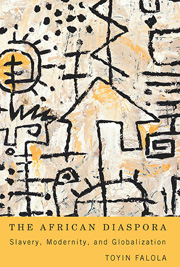Book contents
- Frontmatter
- Dedication
- Contents
- Preface and Acknowledgments
- Introduction: The Old and New African Diaspora
- Part 1 The Old Diaspora: Slavery and Identity Politics
- Part 2 An African Case Study: Yoruba Ethnicity in the Diaspora
- 5 Atlantic Yoruba and the Expanding Frontiers of Yoruba Culture and Politics
- 6 Politics, Slavery, Servitude, and the Construction of Yoruba Identity
- 7 Orisa Music, Dance, and Modernity
- Part 3 The New Diaspora: Transnationalism and Globalization
- Postscript: United States Foreign Policy on Africa in the Twenty-First Century
- Notes
- Bibliography
- Index
6 - Politics, Slavery, Servitude, and the Construction of Yoruba Identity
from Part 2 - An African Case Study: Yoruba Ethnicity in the Diaspora
Published online by Cambridge University Press: 05 September 2013
- Frontmatter
- Dedication
- Contents
- Preface and Acknowledgments
- Introduction: The Old and New African Diaspora
- Part 1 The Old Diaspora: Slavery and Identity Politics
- Part 2 An African Case Study: Yoruba Ethnicity in the Diaspora
- 5 Atlantic Yoruba and the Expanding Frontiers of Yoruba Culture and Politics
- 6 Politics, Slavery, Servitude, and the Construction of Yoruba Identity
- 7 Orisa Music, Dance, and Modernity
- Part 3 The New Diaspora: Transnationalism and Globalization
- Postscript: United States Foreign Policy on Africa in the Twenty-First Century
- Notes
- Bibliography
- Index
Summary
Slavery and freedom operate within a social milieu, an economic system, and political structures. In the nineteenth century, Yoruba warriors who responded to external demands to produce palm oil and palm kernels dominated politics and thus looked for labor to work on their farms. In the first half of the twentieth century, the colonial government in Nigeria began the process of creating formal economies. In the postcolonial phase, the Yoruba developed a much stronger sense of ethnicity in order to compete with other groups in a complicated Nigerian federal system. In the more recent period, political turmoil has created new ideas of ethnicity, a hundred years after the Yoruba ended their long wars of the nineteenth century. The Yoruba's past connects to its present in visible ways.
In the context of my discussion of the role of slavery in the formation of contemporary identity and politics, I will limit myself to four issues:
How the Yoruba confronted the issues of slavery, servitude, pawnship, and the like after the wars of the nineteenth century. Slaves were absorbed into the social mechanisms in place and there was a conversation on the role of domestic slavery in society. However, defining the Yoruba nation, articulating policies to put ideas in practice, and negotiating with British colonial power and with representatives of other ethnicities were bigger projects of politics and nationalism than the specific issues of slavery and freedom.
[…]
- Type
- Chapter
- Information
- The African DiasporaSlavery, Modernity, and Globalization, pp. 163 - 186Publisher: Boydell & BrewerPrint publication year: 2013



